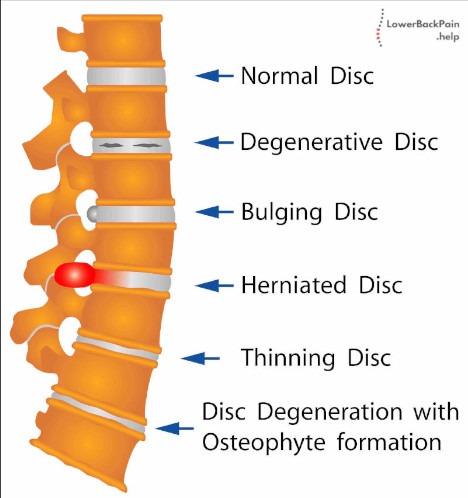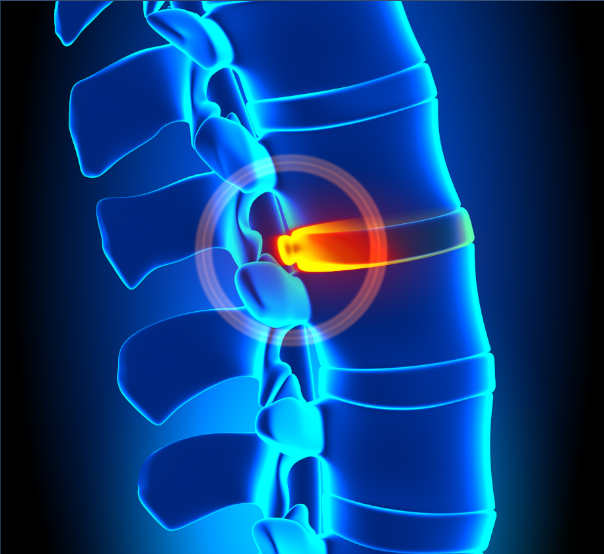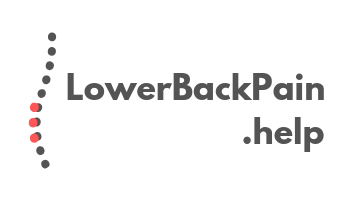A herniated disc can be a real drag on your day.
In a nutshell, you have a herniated disc if one of the rubbery cushions that the rest between the individual vertebrae of your spine slips or ruptures from its normal spot.
Most herniated discs are pushed through the annulus or the barrier that protects the interior of your spine from the outside. See the picture below for more details.

Herniated discs can occur in any part of the spine and might irritate nearby nerves.
Despite the severity of these injuries, it’s not always clear whether you have a herniated disc or some other back malady is giving you trouble.
Let’s take a look at the five most common herniated disc symptoms.
This way, you’ll be able to tell what kind of medical attention you need and if the problem is particularly severe.
1. Leg or Arm Pain
Depending on the location of your herniated disc, you might feel pain in your extended arms or legs.
Herniated discs in the lumbar regions of your spine will probably press on nerves and irritate the lower parts of your body.
This can result in painting your legs, but talks, or thighs. You might even experience pain in parts of your foot.
Alternatively, if your herniated disc is located higher and closer to your neck, you may experience pain in your shoulders and arms.
Either way, the type of pain usually related to a herniated disc is sharp or burning rather than general numbness.
It may also flare up particularly badly if you cough, sneeze, or move in certain positions.
2. Weakness
Since a herniated disc can easily press on the nerves of certain areas of your body, this can have negative effects on your muscles.
In fact, some muscles can be weakened if their controlling nerves are affected.
Therefore, random muscle weakness in certain parts of your body might be a sign of a herniated disc.
Because muscle fatigue and weakness can also be related to other issues, however, you should check with your doctor before determining whether a herniated disc is the real cause of this condition.
Muscle weakness is most accurately identified by an inability to lift or hold items or constant stumbling when you try to walk.

3. Tingling and Numbness
Again, because nerves can be affected by herniated discs, they might be affected negatively by the condition.
Rather than a sharp pain, your nerves might manifest discomfort in the form of numbness or tingling.
This may be particularly intense or it might be rather minor; you should check by pressing on the affected area and seeing whether the numbness becomes more intense in a radiating manner or if it remains stable.
4. Muscle Stiffness
This similar but separate condition is also a sign of herniated discs in some patients.
This isn’t exactly the same thing as muscle fatigue or weakness but it might make it similarly difficult for you to grab objects or walk properly.
Muscle stiffness can manifest as a difficulty for your muscles to move in regular ways.
For instance, a herniated disc that affects your arms might make it hard for you to grab objects or lift your arms for any significant length of time.
Just like with pain or numbness, the location of your herniated disc may affect which muscles are affected by the condition.
This condition occurs because herniated discs can press on nerves to such an extent that they prevent electrical signals from adequately flowing from your brain or the greater nervous system to the muscles in question.
With this condition or muscle weakness, it’s imperative that you go to your doctor as soon as possible.
These herniated disc symptoms can cause life-threatening injuries or accidents, particularly if you try to go about day-to-day activities like driving or walking up and downstairs.
It’s also good to get these checked out in case it’s not a herniated disc but a different condition entirely.
5. Back Pain
Finally, the quintessential symptom of a herniated disc is back pain (of course).
Back pain can manifest either as a dull ache or is a particularly sharp knife-like sensation along your spine.
The pain can be intense or moderate depending on the severity of your herniated disc and its location.
You should generally feel along your spine to see if you can tell any issues before heading to the doctor.
Back pain from a herniated disc can occur from regular walking and standing or from sitting in specific positions.
Generally, the pain will get worse if you cause a herniated disc to rupture more fully or press on the disc by accident.
So exercising is a good choice – but avoid any sudden movements or pressing on your spine.
Conclusion
You should also be aware that some people don’t experience any herniated disc symptoms, and the condition may pass and resolve itself without you ever being the wiser.
However, most people experience one of the above five symptoms or general pain and discomfort.
When in doubt, it’s never a bad idea to check with your doctor and have them perform a routine checkup.
Either way, we hope this guide has been helpful and you’ll be able to more easily identify whether you have a herniated disc as a result.
Remember to check out our guides about herniated disc treatment if you’re certain of your condition; don’t let your disc remain too long before taking action.
Most herniated discs can be treated relatively easily if they are caught early, negating the need for surgery.
